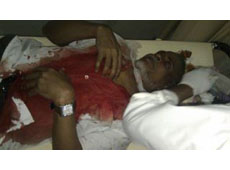President Dr Mohamed Waheed last night told state broadcaster Television Maldives (TVM) that a vice-president should not be treated like a “spare part”.
Speaking in the second of a series of TVM interviews with next month’s presidential candidates, the incumbent president stated his belief that the vice president ought to have more responsibility.
“I believe that changes are needed. A vice president should not be a spare part that replaces the president if he resigns or passes away. The people choose a vice president after careful consideration. They vote for two people, the president and the vice president, on the same ticket,” President Waheed said.
Waheed assumed office on February 7, 2012, after being elevated from his position as vice-president to Mohamed Nasheed. President Nasheed resigned amidst chaotic scenes as police mutinied following weeks of anti-government agitation.
Waheed told his interviewer, Leeza Laurella, that Nasheed had reneged on a prior agreement to hand the vice-president powers over foreign policy – giving preference to fellow Maldivian Democratic Party (MDP) members.
Soon after Waheed assumed the presidency, his frustration with his previous role was described by his then-special advisor Dr Hassan Saeed in a leaked audio recording.
“There was no major role for President Waheed in the previous government. Very many days [spent] bored in the office… When an educated man like him whiles the day away being like this, going on the Internet… really it is sad. This is how Waheed was,” said Dr Saeed.
Prior to his political career, Dr Waheed was notable for being the first Maldivian to gain a doctorate as well as being the first person to appear on Maldivian Television, anchoring TVM’s first broadcast in 1978.
After a short period as a member of the People’s Majlis, Waheed spent a number of years working for UNICEF, eventually becoming Deputy Regional Director for South Asia.
Role in February 7
Responding to the repeated accusations that he did not fulfil his responsibilities in supporting President Nasheed during the February 2012 crisis, Waheed told his interviewer that Nasheed had not asked for his counsel.
“President Nasheed did not call me. If he wanted to talk to me, he could have asked the SPG (Special Protection Group), the same group that protects us both. He could have handed me the phone through them, could he not?”
Maintaining that the events of February 7 marked the final stages of a conspiracy in which Waheed was complicit, the MDP have repeatedly accused Waheed of failing to fulfill his duties as second in command.
Mentioning a late night meeting with anti-Nasheed figures just days before the transfer of power, Waheed told TVM that Nasheed had been informed of the meeting and all normal procedures followed.
MDP MP Mariya Didi manwhile published a report in June 2012 arguing that Waheed’s failure to fully discuss this meeting with the rest of the cabinet represented a violation of his responsibilities as the vice-president.
Waheed had been open on a number of previous occasions regarding his marginalisation in the decision making process, in 2010 describing the Nasheed administration as a “one man show”.
Nasheed will stand against Waheed in September’s poll, having chosen Dr Musthafa Luthfy as his running mate. When making the announcement, the MDP stipulated that Luthfy would call an election immediately should Nasheed be “killed or incapacitated” rather than assuming the presidency himself.
Siyaasath
Waheed yesterday explained that he had chosen his current running-mate, Dhivehi Rayithunge Party (DRP) leader Thasmeen Ali as he is “well-mannered and keeps his word”.
During the interview he also denied that he had described the Adhaalath Party as containing extremist elements – comments which prompted the religious party to leave Waheed’s ‘forward with the nation’ coalition in June, later allying with the Jumhoree Party (JP).
Yesterday’s interview, the second in a series featuring all the presidential hopefuls, followed Friday’s combative encounter with Jumhoree Coalition candidate Ibrahim Gasim.
Following Gasim’s discussion with Laurella, JP deputy leader Ilham Ahmed told local media that the JP would be considering a boycott of the station. Ilham argued that, contrary to the shows title – with ‘siyaasath’ meaning ‘policy’ – the presenter asked Gasim a series of personal questions in an attempt to damage his reputation.
“This was done with the intention of demeaning a person under a systematic plan. We don’t believe that this could have been done under press freedom,” he explained to reporters from Haveeru. “We have seen TVM going after Gasim.”
Ilham also insisted that the show had made repeated attempts to make Gasim appear “odd”.
The Maldives Broadcasting Corporation (MBC) defended its station, telling local media that Gasim’s TVM interview was conducted within its editorial policy.
It was announced in June that TVM would be scheduling a presidential debate featuring all four candidates for September 1.






